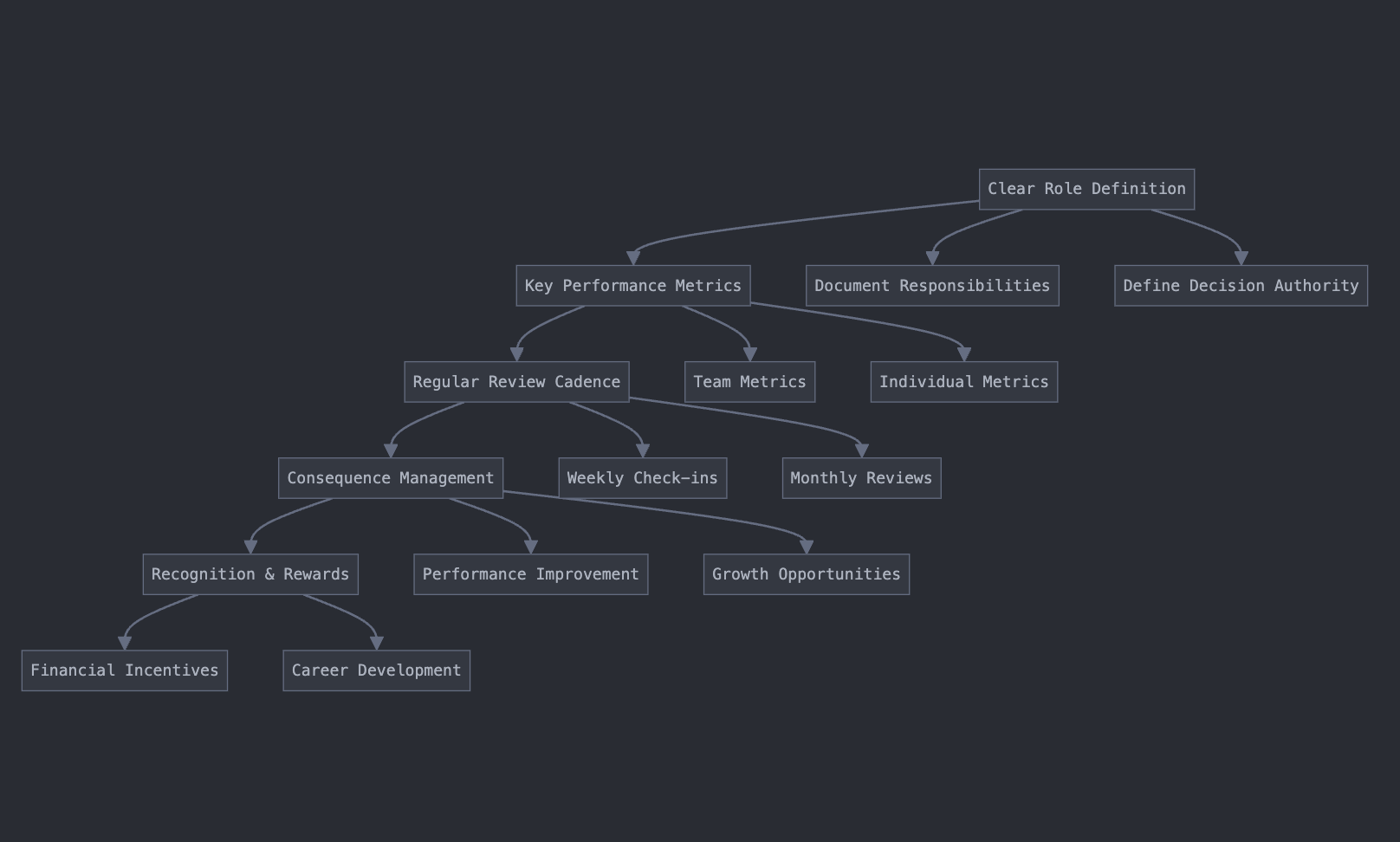Let me break down how to implement each component of this framework:
Clear Role Definition
Create RAPID decision matrices for each leadership position:
Document key responsibilities and expected outcomes
Define boundaries of authority and autonomy
Key Performance Metrics
For each leadership role, establish:
Regular Review Cadence
Implement three levels of accountability meetings:
Weekly (30 mins):
Monthly (2 hours):
Quarterly (1 day):
Consequence Management
Create a clear system for:
Implementation Steps
Week 1-2:
Week 3-4:
Week 5-8:
Critical Success Factors:
Tools and Templates Needed:
To make this sustainable:
Clear Role Definition
Create RAPID decision matrices for each leadership position:
- R (Recommend) - Who prepares the proposal
- A (Agree) - Who must agree before moving forward
- P (Perform) - Who executes the decision
- I (Input) - Who should be consulted
- D (Decide) - Who has final decision authority
Document key responsibilities and expected outcomes
Define boundaries of authority and autonomy
Key Performance Metrics
For each leadership role, establish:
- Leading indicators (predictive metrics)
- Lagging indicators (result metrics)
- Financial metrics tied to profitability
- Team development metrics Example metrics by department:
- Sales: Gross margin %, Pipeline value, Customer retention
- Operations: Order fulfillment rate, Inventory turnover, Cost savings
- Marketing: Lead generation, Campaign ROI, Brand engagement
- Supply Chain: Vendor performance, Stock accuracy, Cost reduction
Regular Review Cadence
Implement three levels of accountability meetings:
Weekly (30 mins):
- Quick metrics review
- Roadblock removal
- Next week's priorities
Monthly (2 hours):
- Detailed performance review
- Strategic initiative updates
- Cross-functional alignment
Quarterly (1 day):
- Strategic review
- Team development
- Long-term planning
Consequence Management
Create a clear system for:
- Performance improvement plans with specific timelines
- Recognition and rewards for meeting/exceeding targets
- Career development opportunities
- Exit criteria for consistent underperformance
Implementation Steps
Week 1-2:
- Draft role documents and RAPID matrices
- Get input from each leader on metrics
- Set up meeting cadence
Week 3-4:
- Finalize metrics and targets
- Train team on new framework
- Begin weekly meetings
Week 5-8:
- Start monthly reviews
- Refine metrics based on feedback
- Document early wins and challenges
Critical Success Factors:
- Consistency in follow-through
- Clear communication of expectations
- Regular feedback loops
- Documentation of decisions and outcomes
- Focus on solutions over blame
- Celebration of wins
Tools and Templates Needed:
- Role clarity documents
- Metrics dashboards
- Meeting agendas and minutes
- Performance improvement templates
- Decision logs
- Action item tracking system
To make this sustainable:
- Start small - Pick 3-5 key metrics per leader
- Make it visible - Use visual management boards
- Keep it simple - Focus on what matters most
- Be consistent - Don't skip accountability meetings
- Document everything - Create a clear paper trail
- Follow through - Address issues promptly
- Celebrate success - Recognize progress regularly



